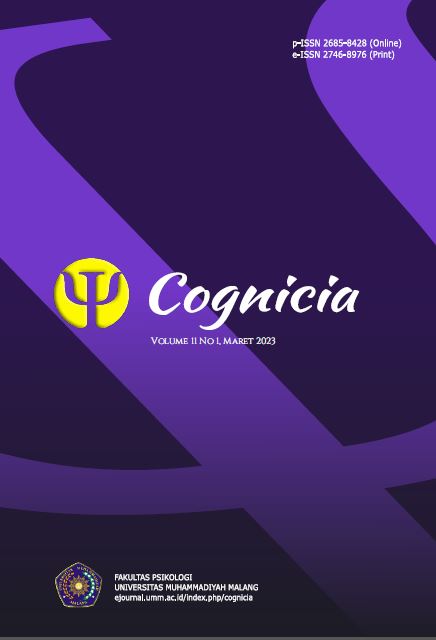Hubungan pengungkapan diri dengan pemaafan pada remaja
DOI:
https://doi.org/10.22219/cognicia.v11i1.24972Abstract
Forgiveness to others can be given when self-disclosure has been made. This study aims to determine the relationship between self-disclosure and forgiveness in adolescents. The research design uses a non-experimental quantitative type of correlational study. Subjects were 199 high school (SMA) youth and equivalent. The sampling technique uses accidental sampling. The measuring tool uses the Conceptualizing and Measuring Self-Disclosure scale and the Transgression-Related Interpersonal Motivation scale (TRIM-18). Results Analysis of the data using Spearman's rho showed a negative relationship between self-disclosure and forgiveness (r=-0.487; p<0.001). This means that adolescents who are more open in expressing themselves will tend to find it more difficult to forgive others. Thus, explaining oneself broadly and deeply is done by adolescents because they have not forgiven other people who are in conflict with them.
Keywords: Adolescences, forgiveness, self-disclosure
Downloads
References
Agung, I. M. (2015). Pengembangan dan validasi pengukuran skala pemaafan TRIM-18. Jurnal Psikologi, 11(2), 79-87. http://dx.doi.org/10.24014/jp.v11i2.1558
Alawwiyah, N. (2020). Pengaruh empati terhadap pemaafan dan percaya diri dalam hubungan pertemanan. 10.31234/osf.io/ndu95
Alentina, C. (2016). Memaafkan (forgiveness) dalam konfik hubungan persahabatan.Jurnal Ilmiah Psikologi. 9(2) 168-174. https://core.ac.uk/reader/231281500
Arif, I. S. (2018). Psikologi positif. Jakarta: PT. Gramedia Pustaka Utama.
Azwar, S. (2017). Metode penelitian psikologi: edisi II. Yogyakarta: Pustaka Pelajar.
Berk, L. E. (2010). Development through the lifespan: dari prenatal sampai remaja. Yogyakarta: Pustaka Pelajar
DeVito,J. A. (2015). Komunikasi antar manusia (ed.5). Jakarta: Profesional Books.
Dwityaputri, Y. K., & Sakti, H. (2015). Hubungan antara regulasi emosi dengan forgiveness pada siswa Di SMA Islam Cikal Harapan BSDTangerang Selatan. Jurnal Empati-Empati, 4(2), 20–25. https://doi.org/10.14710/empati.2015.14886
Gainau, M. B. (2009). Keterbukaan diri (self disclosure) siswa dalam perspektif budaya dan implikasinya bagi konseling. Jurnal ilmiah widya warta, 33(1), 95-112. http://203.189.120.189/ejournal/index.php/jiw/article/download/17061/17024
Gilo, T., Feigelman, W., & Levi-Belz, Y. (2022). Forgive but not forget: From self-forgiveness to posttraumatic growth among suicide-loss survivors. Death studies, 46(8), 1870-1879.
Lin, R., & Utz, S. (2017). Self-disclosure on SNS: Do disclosure intimacy and narrativity influence interpersonal closeness and social attraction?. Computers in Human Behavior, 70, 426-436. https://doi.org/10.1016/j.chb.2017.01.012
Kusprayogi, Y. & Nashori. (2016). Kerendahan hati dan pemaafan pada remaja. Jurnal penelitian Psikologi, 1 (1), 12 - 29. ISSN: 1502 - 9363. https://103.19.37.186/index.php/Psikohumaniora/article/download/963/925
McCullough, M. E. (2000). Forgiveness as human strength: Theory, measurement, and links to well-being. Journal of social and clinical psychology, 19(1), 43-55. https://greatergood.berkeley.edu/images/uploads/McCullough-Forgiveness_as_Prosocial_Change_Reducing_Revenge_and_Stress.pdf
McCullough, M. E., Worthington Jr, E. L., & Rachal, K. C. (1997). Interpersonal forgiving in close relationships. Journal of personality and social psychology, 73(2), 321.
Nashori, F. (2011). Meningkatkan kualitas hidup dengan pemaafan. Jurnal UNISIA, 33(75). https://journal.uii.ac.id/index.php/Unisia/article/download/5584/5008
Nisa, I. (2012). Hubungan antara trust dengan self-disclosure pada hubungan pertemanan. Skripsi. Fakultas Psikologi, Universitas Muhammadiyah Malang, Malang. http://eprints.umm.ac.id/id/eprint/30205
Paramitasari, R. Alfian, I.N (2012). Hubungan antara kematangan emosi dengan kecenderungan memaafkan pada remaja akhir. Jurnal Psikologi Pendidikan dan Perkembangan, vol 1 (2) 1-7. http://repository.unair.ac.id/id/eprint/106416
Rahman, F. (2010). Hubungan egosentrisme dengan kompetensi sosial remaja siswa SMP Muhammadiyah 22 Setia Budi Pamulang. Skripsi. Fakultas Psikologi, UIN Syarif Hidayatullah Jakarta, Jakarta.
Safitri, A. M. (2017). Proses dan faktor yang mempengaruhi perilaku memaafkan pada remaja broken home. Psikoborneo: Fakultas Ilmu Sosial dan Ilmu Politik Universitas Mulawarman Samarinda, 5(1), 152-161. http://dx.doi.org/10.30872/psikoborneo.v5i1.4328
Santoso, S., & Tjiptono. (2001). Riset Pemasaran Konsep dan Aplikasi dengan SPSS. Jakarta : Elex Media Komputindo.
Sari, D. P. C., & Prahesti, D. (2017). Keterbukaan diri pada remaja korban cyberbullying. Jurnal Psikoborneo, 5(1), 145-151.
Setyawati, I., & Rahmandani, A. (2018). Hubungan pengungkapan diri terhadap teman sebaya dengan pemaafan pada remaja. Jurnal EMPATI, 6(4), 444-450. https://doi.org/10.14710/empati.2017.20118
Utami, D. A. (2015). Kepercayaan interpersonal dengan pemaafan dalam hubungan persahabatan. Jurnal Ilmiah Psikologi Terapan, 3(1), 54–70. https://doi.org/10.22219/JIPT.V3I1.2126
Wahdah, N. I. (2016). Hubungan kontrol diri dan pengungkapan diri dengan intensitas penggunaan Facebook pada siswa SMP Sunan Giri Malang. Skripsi. Universitas Islam Negeri Maulana Malik Ibrahim. http://etheses.uin-malang.ac.id/5238/1/12410197.pdf
Wardhati, L. T. & Faturochman, P. P. (2017). Psikologi pemaafan. Buletin Psikologi. http://fatur.staff.ugm.ac. id/file/Psikologi% 20% 20Pemaafan.pdf
Wheeless, L. R. & Grotz, J. (1976). Conceptualization and measurement of reported self‐disclosure. Human communication research, 2(4), 338-346. https://doi.org/10.1111/j.1468-2958.1976.tb00494.x
Wulandari, I., & Megawati, F. E. (2020). The role of forgiveness on psychological well-being in adolescents. Advances in Social Science, Education and Humanities Research, volume 395. https://dx.doi.org/10.2991/assehr.k.200120.022
Downloads
Published
How to Cite
Issue
Section
License
Copyright (c) 2023 Nada De Audry dan Alifah Nabilah Masturah

This work is licensed under a Creative Commons Attribution-ShareAlike 4.0 International License.
Authors who publish with Jurnal Cognicia agree to the following terms:
- For all articles published in Jurnal Cognicia, copyright is retained by the authors. Authors give permission to the publisher to announce the work with conditions. When the manuscript is accepted for publication, the authors agree to automatic transfer of the publishing right to the publisher.
- Authors retain copyright and grant the journal right of first publication with the work simultaneously licensed under a Creative Commons Attribution-ShareAlike 4.0 International License that allows others to share the work with an acknowledgment of the work's authorship and initial publication in this journal.
- Authors are able to enter into separate, additional contractual arrangements for the non-exclusive distribution of the journal's published version of the work (e.g., post it to an institutional repository or publish it in a book), with an acknowledgment of its initial publication in this journal.
- Authors are permitted and encouraged to post their work online (e.g., in institutional repositories or on their website) prior to and during the submission process, as it can lead to productive exchanges, as well as earlier and greater citation of published wor (See The Effect of Open Access).

This work is licensed under a Creative Commons Attribution-ShareAlike 4.0 International License







